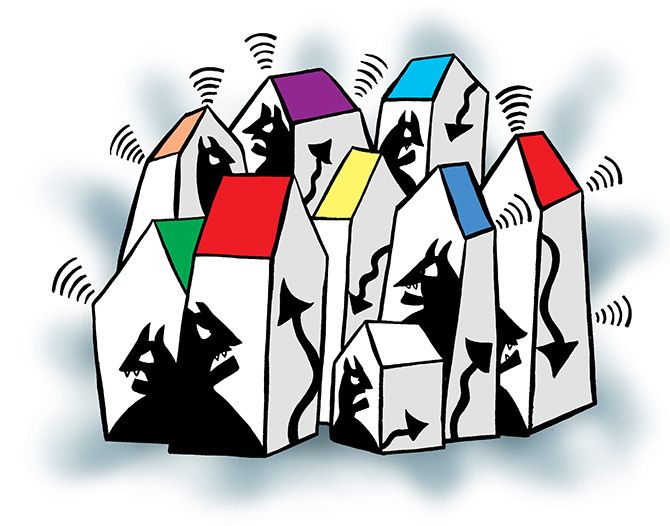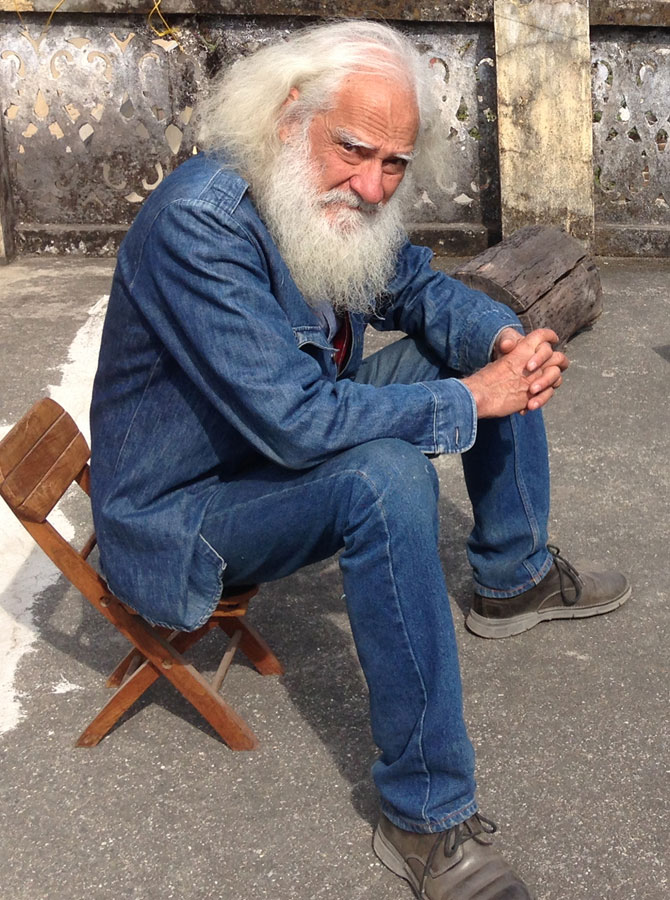'In the lingo of Star Trek, how willing are we to keep all hailing frequencies open in order to listen more closely and with empathy to whoever we consider the 'other',' asks Rajni Bakshi.
Illustration: Uttam Ghosh/Rediff.com

'Intolerance in the 23rd century? Improbable! If man survives that long, he will learn that differences in ideas and attitudes are a delight.'
These words of Gene Roddenberry, creator of Star Trek, formed the centre piece of an exhibit to mark 50 years of the vastly influential television series.
Mounted at the Experience Music Project Museum in Seattle in the summer of 2016, that exhibit was overtly unrelated to current events. And yet this panel raises the bar for people, in societies across the world, who believe in celebrating differences and are currently feeling beleaguered.
What can such people do about an apparently global erosion of elementary civility in liberal public culture? It's not just about the tenor of the Brexit and US presidential campaigns -- both marked by jingoism and racism.
Hate-filled content is globally rife on social media. From societies across the world, there are reports of a rise in public expressions of animosity towards some 'other.'
First and foremost, it is vitally important to challenge the common claim that these dark energies are a by-product of economic stagnation and vast income disparities.
Unless we acknowledge that hatred and prejudice have a life of their own, it will be impossible to realise that material abundance alone is not an effective antidote.
Secondly, despite high decibel expressions there is actually no way of knowing if racism and ethnic prejudice are anywhere close to overtaking societies.
But this is the easy part.
The tougher challenge lies in liberals everywhere seeking anchors that are deeper and more meaningful than the deracinated 'political correctness' that has taken over the Western world. This has two implications.
One that any hint of discomfort or distance or dislike of someone different from one's self need not be 'racism' or 'sexism.' And two that sometimes it is those who don't overtly celebrate differences who have a more organic ability to live-and-let-live.
For instance, Indian sociologist Ashis Nandy did a study of an area of Cochin where people of four religions have lived together for over a millennia without any record of ethnicity related violence.
Nandy found that each of those communities -- Christian, Hindu, Jewish and Muslim -- did not have a very high view of the other communities. They didn't particularly like each other and members of every community considered themselves superior to those in other communities.
And yet in some ineffable way each community defined itself through the 'other.' Being anchored in deep cultural roots fostered a self-confidence that enabled each group to, as Nandy puts it, 'embrace the otherness of the other.'
Modern liberalism often cannot distinguish such cultural realities from prejudice and racism. That is partly because it is rooted in a teleological frame that treats those who are subject to identity based animosities as vestiges of our species' primitive past.
This often leaves little room for acknowledging that people slip in and out of being angry and hateful.
Thus liberals run the risk of falling into the trap of treating the racist, the identity jingoist, as an 'other' to be condemned, regarded as a retard, someone permanently locked into a 'backward' mental frame.
But even a teleological frame must allow for individuals being at different stages of movement towards the ideal. In any case hating the hater helps no one.
There are indeed groups and organisations, in most countries, that thrive on fanning hatred and using it as a tool of political mobilisation. Many unpredictable variables determine what numbers such organisations enrol in their ranks.
One important factor is how liberals act towards those who are susceptible and vulnerable to the recruitment strategies of those who thrive on splicing the world community into bitterly competing, and increasingly narrow, identities.
This undertaking may not be as ambitious, or onerous, as it first seems. What it calls for is the willingness to carefully, patient listen -- in order to decipher the concern and the hurt behind the complaint, the anger, the hatred.
Only then can we give birth to the possibility of genuine dialogue -- creating a chance to reach out across divides.
In the lingo of Star Trek, how willing are we to keep all hailing frequencies open in order to listen more closely and with empathy to whoever we consider the 'other'?
Rajni Bakshi, author of Bapu Kuti: Journeys in Rediscovery of Gandhi, is the senior Gandhi Peace Fellow at Gateway House: Indian Council on Global Relations.











 © 2025
© 2025